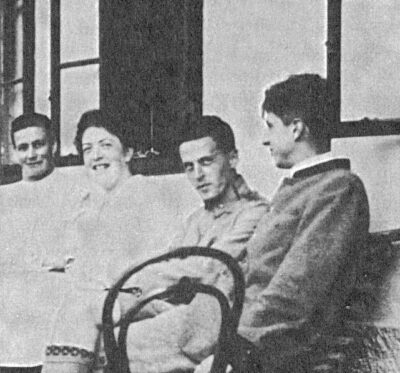ウィトゲンシュタイン 言語ゲーム入門! その言語哲学の業績と影響

Introduction to Wittgenstein’s Language Games! His Contributions and Influence on Philosophy of Language
イントロダクション
ウィトゲンシュタインの言語哲学は、現代思想に革命をもたらしました。
彼の「言語ゲーム」の概念は、言葉の意味が使用される文脈に依存するという考え方を示唆しています。
本記事では、ウィトゲンシュタインの業績を初心者にも分かりやすく紹介し、彼の理論がどのように様々な分野に影響を及ぼしているかを探ります。
言語の使い方を通じて世界を理解する彼のアプローチは、今日の私たちにとっても重要な洞察を提供してくれるのです。
Introduction
Wittgenstein’s philosophy of language has revolutionized modern thought.
His concept of “language games” suggests that the meaning of words depends on the context in which they are used.
In this article, we will introduce Wittgenstein’s achievements in a way that is accessible even to beginners, exploring how his theories have influenced various fields.
His approach to understanding the world through the use of language provides important insights for us today.
ウィトゲンシュタインとは?―哲学への貢献
ルートヴィヒ・ウィトゲンシュタインは、20世紀を代表する哲学者で、言語哲学と分析哲学に大きな足跡を残しました。
彼の哲学は、言葉と世界の関係性を探求し、その中で「言語ゲーム」という概念を導入しました。
この言語ゲームは、言語の使用が多様な形式をとり、それぞれのゲームが独自のルールを持つという考え方です。
ウィトゲンシュタインは、オーストリア出身で、ケンブリッジ大学で哲学教授を務めました。
彼の主著『論理哲学論考』は、論理哲学の分野における画期的な作品であり、その中で彼は言語の限界が世界の限界であると主張しました。
また、後期の作品「哲学探究」では、記号論理学を超えた言語の日常的な使用に焦点を当て、言語の意味はその使用において見出されると述べました。
彼の考え方は、哲学のみならず、言語学、心理学、数学、コンピュータ科学など多岐にわたる分野に影響を与えています。
ウィトゲンシュタインの哲学的探究は、現代思想における重要な基盤となり、今日でも多くの研究者によって継続的に議論されています。
彼の提唱した言語ゲームの概念は、言語哲学における中心的なテーマの一つであり続けており、彼の貢献は計り知れないものがあります。
Who is Wittgenstein? – Contributions to Philosophy
Ludwig Wittgenstein was a leading philosopher of the 20th century, leaving significant marks in the fields of philosophy of language and analytic philosophy.
His philosophy explored the relationship between language and the world, introducing the concept of “language games.”
This idea suggests that language use takes various forms, each game having its own set of rules.
Wittgenstein, originally from Austria, served as a philosophy professor at the University of Cambridge.
His seminal work, “Tractatus Logico-Philosophicus,” was a groundbreaking piece in the field of logical philosophy, where he argued that the limits of language are the limits of the world.
In his later work, “Philosophical Investigations,” he shifted focus to the everyday use of language beyond symbolic logic, asserting that meaning in language is found in its use.
His ideas have influenced not only philosophy but also linguistics, psychology, mathematics, computer science, and other diverse fields.
Wittgenstein’s philosophical inquiries form a crucial foundation in contemporary thought, continually debated by scholars today.
His concept of language games remains a central theme in philosophy of language, underscoring his immense contributions.

Portrait of Ludwig’s Sister, Margarete, by Gustav Klimt (1905)
ルートヴィヒ・ウィトゲンシュタインの生涯
ルートヴィヒ・ウィトゲンシュタインは1889年にオーストリア=ハンガリー帝国で生まれました。
The Life of Ludwig Wittgenstein
Ludwig Wittgenstein was born in 1889 in the Austro-Hungarian Empire.

Wittgenstein during His University Days (1910)
彼の知的旅路は、工学から哲学へと大きく舵を切り、特に言語哲学において顕著な功績を残しました。
彼の主著『論理哲学論考』は、論理の構造と現実の関係を探求し、分析哲学の基礎を築きました。
この作品では、言語が世界を映し出す鏡であるという考え方を提示し、記号論理学の重要性を強調しています。
ウィトゲンシュタインはまた、後期の著作『哲学探究』で「言語ゲーム」という概念を導入しました。
彼によれば、言語は多様な機能を持つゲームのようなものであり、その使用法は文脈に依存するとしています。
この革新的な視点は、言語の使い方がその意味を決定するという理解を深めることに貢献しました。
ウィトゲンシュタインの思想は、普遍論理を追求する過程で、哲学的な問いの性質を根本から問い直すことにつながりました。
彼の独特な哲学的アプローチは、言語の本質と機能に関する議論を新たな方向に導き、後世の哲学者や学者に多大な影響を与え続けています。
ウィトゲンシュタインは1951年に亡くなりましたが、彼の思想は現代哲学においてもなお中心的な役割を果たしており、言語哲学や分析哲学を学ぶ者にとって欠かせない存在となっています。
彼の生涯と業績は、哲学の歴史における一つの大きな節として記憶されるでしょう。
言語哲学におけるウィトゲンシュタインの位置づけ
ルートヴィヒ・ウィトゲンシュタインは、20世紀の言語哲学と分析哲学において中心的な人物です。
彼の思想は、論理哲学と記号論理学の発展に大きく寄与しました。
ウィトゲンシュタインの生涯は、哲学への深い貢献とともに語られます。彼は、言語を行為の一形態と見なす「言語ゲーム」の概念を通じて、言語の意味と機能に新たな光を当てました。
ウィトゲンシュタインの位置づけは、普遍論理の探求から始まりました。
彼は、言語の本質を理解することが哲学的問題を解決する鍵であると考えました。
彼の初期の著作「論理哲学論考」では、思考と現実の関係を言語を介して明らかにしようと試みました。後期の作品では、言語の使用に焦点を当て、言語が多様な形で私たちの生活に組み込まれていることを示しました。
彼のアプローチは、言語哲学の研究において革新的であり、後の多くの哲学者に影響を与えました。
ウィトゲンシュタインは、言語の形式的な側面だけでなく、その日常的な使用と文脈の重要性を強調しました。
これにより、言語哲学は新たな方向性を見出し、言語が持つ意味と目的についての理解が深まりました。
ウィトゲンシュタインの業績は、言語哲学と分析哲学の領域において、今日もなお議論と研究の対象となっています。
彼の「言語ゲーム」の概念は、言語の柔軟性と多様性を理解する上で不可欠なものとなり、現代の言語哲学における彼の位置づけを不動のものとしています。
The Intellectual Journey of Ludwig Wittgenstein: From Engineering to Philosophy
Ludwig Wittgenstein was born in 1889 in the Austro-Hungarian Empire and significantly redirected his path from engineering to philosophy, leaving a profound mark, especially in the field of language philosophy.
His seminal work, “Tractatus Logico-Philosophicus,” explored the structure of logic and its relationship to reality, laying the foundation for analytical philosophy. In this work, he proposed that language acts as a mirror reflecting the world, emphasizing the importance of symbolic logic.
Additionally, in his later work “Philosophical Investigations,” Wittgenstein introduced the concept of “language games,” suggesting that language functions like diverse games, each with its own set of rules depending on context. This innovative perspective contributed to a deeper understanding that the meaning of language is found in its usage.
Wittgenstein’s philosophical pursuit of universal logic prompted a fundamental re-examination of philosophical questions. His unique philosophical approach redirected discussions on the essence and function of language to new directions, continuing to influence scholars and philosophers in various fields.
Although Wittgenstein passed away in 1951, his ideas continue to play a central role in contemporary philosophy, particularly for those studying language philosophy and analytical philosophy. His life and achievements will be remembered as a significant chapter in the history of philosophy.
Positioning Wittgenstein in the Realm of Language Philosophy
Ludwig Wittgenstein stands as a central figure in 20th-century language philosophy and analytical philosophy. His thoughts greatly contributed to the development of logical philosophy and symbolic logic.
Wittgenstein’s life is discussed in conjunction with his deep contributions to philosophy. He illuminated the meaning and function of language through the concept of “language games,” viewing language as a form of action.
Beginning with his pursuit of universal logic, Wittgenstein believed that understanding the essence of language was key to solving philosophical problems.
In his early work, “Tractatus Logico-Philosophicus,” he attempted to clarify the relationship between thought and reality through language. In his later works, he focused on language use and emphasized how language is integrated into various aspects of our lives.
His approach was innovative in the study of language philosophy, influencing many philosophers who followed him.
Wittgenstein emphasized not only the formal aspects of language but also the importance of its everyday use and context.
As a result, language philosophy found new directions, deepening our understanding of the meanings and purposes of language.
Wittgenstein’s achievements continue to be the subject of discussion and research in the fields of language philosophy and analytical philosophy.
His concept of “language games” has become indispensable for understanding the flexibility and diversity of language, solidifying his place in contemporary language philosophy.

Ludwig Wittgenstein at the Time of the Publication of the “Tractatus” (Seated Second from the Right, 1920)
言語ゲームの概念を理解する
ルートヴィヒ・ウィトゲンシュタインは、言語哲学および分析哲学に大きな影響を与えた哲学者です。
彼の提唱する言語ゲームの概念は、言語の使用が多様な形式をとり得るという考え方に基づいています。
この理論は、論理哲学や記号論理学の伝統的な枠組みを超え、言語の意味が使用の文脈によって変わるという視点を提供しています。
「言語ゲーム」とは何かという疑問に答えるためには、まず言語が単なる名前や事物の記述以上のものであるというウィトゲンシュタインの見解を理解する必要があります。
彼は、言語が行為の一形態であり、具体的な生活の文脈の中で意味を持つと考えました。この理論は、普遍論理とは異なり、言語の役割が文化や社会によって異なることを認めています。
言語ゲームの例を挙げることで、その意義をより深く探ることができます。
たとえば、挨拶、命令、冗談といった日常の言語行為はすべて異なるルールや目的を持つ言語ゲームと捉えられます。これらの言語ゲームは、それぞれの社会的文脈や参加者の意図に応じて意味を獲得します。
ウィトゲンシュタインの言語ゲームの概念は、言語の柔軟性とその実践的な側面に光を当て、言語の理解と分析に新たな次元をもたらしました。
この理論は、言語がどのように私たちの認識と世界との関わりを形作るかを探求する際の重要な枠組みとなっています。
言語ゲームとは何か?
言語ゲームという概念は、ルートヴィヒ・ウィトゲンシュタインによって提唱された言語哲学の重要な考え方です。
彼の思想は分析哲学において中心的な役割を果たし、言語の使用をゲームに例えることで、言語の多様性とその使用状況に応じた意味の変化を説明しました。
この視点は、論理哲学や記号論理学における言語の形式的側面だけでなく、普遍論理を超えた日常言語の実践的側面にも光を当てます。
言語ゲームは、単に言葉のルールに従った使用を指すのではなく、その言葉が使われる文脈や参加者の意図、行動と密接に関連しています。
例えば、命令、質問、冗談といった異なる言語活動はそれぞれ独自のルールを持つゲームと見なされます。これらのゲームは、言葉が持つ意味を形作る上で不可欠な要素となります。
ウィトゲンシュタインは、言語ゲームを通じて、言語の意味は静的なものではなく、使用される状況によって変わると主張しました。
この考え方は、言語の理解を深めるだけでなく、哲学的な問題や誤解を解消する手段としても役立っています。
言語ゲームの理論は、教育、心理学、人工知能といった多様な分野に影響を与え続けており、現代哲学における不可欠な概念の一つとされています。
言語ゲームの例とその意義
ルートヴィヒ・ウィトゲンシュタインが提唱した言語ゲームの概念は、言語哲学及び分析哲学における重要な概念です。
彼は言語ゲームを用いて、言葉の意味が使用される文脈に依存すると主張しました。
この考え方は、論理哲学や記号論理学における従来の普遍論理のアプローチとは一線を画すものであり、言語の多様性と柔軟性を強調しています。
言語ゲームとは、特定のルールに従って言語が使われる活動のことを指します。
例えば、命令、質問、物語を語るなど、日常生活におけるさまざまな言語活動が言語ゲームの例です。
これらの活動が持つ意義は、単に言葉の意味を伝えるだけでなく、人々の行動や考え方に影響を与えることにあります。
ウィトゲンシュタインの理論は、言語が単なる情報伝達の手段ではなく、人間の行動や文化の一部であるという視点を提供します。
言語ゲームの理解を深めることは、異なる文化やコミュニティにおけるコミュニケーションの複雑さを理解する手助けとなります。
また、言語教育や人工知能の分野においても、この概念は言語の教授法や機械学習アルゴリズムの開発に影響を与えています。
ウィトゲンシュタインによる言語ゲームの提案は、言語哲学だけでなく、思考の枠組みを広げるための重要なツールとして、今日でも多くの分野で参照されています。
Understanding the Concept of Language Games
Ludwig Wittgenstein, a philosopher who profoundly influenced the fields of philosophy of language and analytic philosophy, introduced the concept of language games.
His theory suggests that language use can take various forms, depending on its context, challenging traditional frameworks in logical and symbolic logic.
To grasp what “language games” entail, it’s crucial to first understand Wittgenstein’s view that language is more than just naming or describing things. He viewed language as a form of action imbued with meaning within specific contexts of everyday life. This perspective diverges from universal logic, acknowledging that language’s role varies across cultures and societies.
Examining examples of language games deepens our understanding of their significance. Greetings, commands, and jokes in everyday language are all considered distinct language games, each with its own rules and purposes. These games acquire meaning depending on social contexts and the intentions of participants.
Wittgenstein’s concept of language games sheds light on the flexibility and practical aspects of language, bringing a new dimension to the understanding and analysis of language.
This theory not only enriches our comprehension of how language shapes our cognition and interaction with the world but also serves as a fundamental framework for exploring philosophical inquiries and resolving misunderstandings.
The theory of language games continues to influence diverse fields such as education, psychology, and artificial intelligence, remaining an essential concept in contemporary philosophy.
Examples and Significance of Language Games
The concept of language games, proposed by Ludwig Wittgenstein in the realms of philosophy of language and analytic philosophy, is pivotal.
He argued that the meaning of language depends on the context in which it is used, contrasting with the traditional approach of universal logic and symbolic logic.
Language games refer to activities where language is used according to specific rules.
For instance, giving orders, asking questions, and storytelling are examples of different language activities, each governed by its own set of rules. The significance of these activities lies not only in conveying meaning but also in influencing people’s actions and thoughts.
Wittgenstein’s theory offers a perspective that sees language not merely as a means of conveying information but as an integral part of human behavior and culture.
Deepening our understanding of language games helps us grasp the complexities of communication across different cultures and communities.
Moreover, this concept impacts language education and the development of machine learning algorithms in fields like artificial intelligence.
Wittgenstein’s proposal of language games continues to be referenced in many fields today as a crucial tool for expanding frameworks of thought, not only in philosophy of language but also in broadening our understanding of human cognition and interaction.

The Stoneboro House Designed by Wittgenstein
ウィトゲンシュタイン言語ゲームの哲学的背景
ウィトゲンシュタインが提唱した言語ゲームの概念は、言語哲学のみならず、分析哲学の領域においても重要な位置を占めています。
彼の思想は、論理哲学や記号論理学の伝統に根ざしつつ、普遍論理の枠を超えた新たな理解の道を切り開いたと言えるでしょう。
言語ゲームとは、言葉の意味が使用される文脈によって変わるという考え方であり、これは『哲学探究』において詳細に展開されています。
その哲学的背景には、論理実証主義との対話があります。
ウィトゲンシュタインは、言語の意味は経験に基づく検証可能性によってのみ定義されるという論理実証主義者たちの主張に対し、私たちの言語行為が多様な形態をとり得ることを指摘しました。
彼によれば、言語はゲームのようなものであり、そのルールは文脈によって異なるというのです。
『哲学探究』における言語ゲームの展開は、このような背景を持ちながら、言語の実践的な側面に焦点を当てています。
ウィトゲンシュタインは、言語の意味はその使用方法に依存すると主張し、単純な命題の真偽を超えた言語の多様性を強調しました。
この視点は、後の分析哲学における議論に大きな影響を与え、言語の理解という枠組みを拡張する一助となりました。
ルートヴィヒ・ウィトゲンシュタインの言語ゲームに対する哲学的アプローチは、言語哲学のみならず、私たちの思考と世界の理解に対する深い洞察を提供するものです。
それは、言葉が単なる記号の集まりではなく、生きた行為であることを示唆しており、今日でも多くの研究者によってその意義が探求され続けています。
論理実証主義との対話
論理実証主義との対話は、ルートヴィヒ・ウィトゲンシュタインの思想において重要な転換点を示します。
彼の初期の作品である『論理哲学論考』では、言語は世界の論理的構造を反映しているという考えを提示しました。
これは記号論理学に基づく見解であり、分析哲学の一環として言語の明晰さを追求することが重視されていました。
しかし、ウィトゲンシュタインの後期の主著『哲学探究』では、言語ゲームの概念を通じて言語の使用と意味の多様性に焦点を当てました。
ここで彼は、言語は単に事実を記述するためだけのものではなく、人々の生活の中で多様な形で使用されると論じました。
これは言語哲学における普遍論理の探求を超え、文脈に依存する言語の役割を強調するものでした。
ウィトゲンシュタインは、言語ゲームという考え方を用いて、論理実証主義者たちが持っていた言語の意味に関する限定的な見解に異を唱えました。
彼は、言語の意味は使用によって決まると主張し、これにより言語の柔軟性と創造性を認識することができるようになりました。
言語哲学の観点から見れば、ウィトゲンシュタインのこの変遷は、言語の理解を深めるために不可欠なステップでした。
『哲学探究』と言語ゲームの展開
ルートヴィヒ・ウィトゲンシュタインは、言語哲学と分析哲学の領域で重要な貢献をした哲学者です。
彼の著作『哲学探究』において提唱された「言語ゲーム」の概念は、言語の機能と使い方を理解する上で画期的な考え方を提示しました。
この言語ゲームは、言葉が単に固定された意味を持つのではなく、その使用状況に応じて意味が変わるという視点を強調します。
ウィトゲンシュタインの思想は、論理哲学や記号論理学の伝統に根ざしているものの、論理実証主義との明確な対話を通じて進化しました。
彼は、言語の使い方が多様であり、日常生活の中での言語の役割をより深く掘り下げることで、普遍論理の限界を指摘しました。
『哲学探究』の中でウィトゲンシュタインは、言語ゲームの展開を通じて、哲学的問題が言語の誤用に起因すると主張しました。
彼によれば、言語の本質的な目的はコミュニケーションであり、言葉は様々な形で生活の中に組み込まれています。
この視点は、言語の理解を深めるだけでなく、哲学的な混乱を解消する手段としても機能します。
ウィトゲンシュタインの言語ゲームへのアプローチは、言語哲学のみならず、心の哲学や倫理学など他の哲学的分野にも影響を与え続けています。
言葉の使い方が文脈によって変わるという彼の見解は、言語の柔軟性と創造性を強調し、現代哲学における重要な議論の一環となっています。
Philosophical Background of Wittgenstein’s Language Games
Wittgenstein’s concept of language games occupies a crucial position not only in philosophy of language but also in the realm of analytical philosophy.
His ideas, rooted in the traditions of logical positivism and symbolic logic, paved new paths beyond the framework of universal logic.
The notion of language games suggests that the meaning of language varies depending on the context of its usage, elaborated extensively in “Philosophical Investigations.”
This philosophical background involves a dialogue with logical positivism.
Wittgenstein pointed out that while logical positivists argued that the meaning of language is defined only by empirical verification, our linguistic acts can take various forms.
According to him, language behaves like a game, and its rules vary depending on the context.
The development of language games in “Philosophical Investigations” focuses on the practical aspects of language, while considering this backdrop.
Wittgenstein argued that the meaning of language depends on its usage and emphasized the diversity of language beyond mere propositions of truth and falsehood.
This perspective had a profound impact on subsequent discussions in analytical philosophy, expanding the framework of understanding language.
Wittgenstein’s philosophical approach to language games offers profound insights into our understanding of language philosophy and its application to our comprehension of thought and the world.
It suggests that language is not merely a collection of symbols but a living act, continually explored by scholars today.
Dialogue with Logical Positivism
The dialogue with logical positivism represents a pivotal turning point in Ludwig Wittgenstein’s philosophy.
In his early work, “Tractatus Logico-Philosophicus,” he proposed that language reflects the logical structure of the world.
This viewpoint, based on symbolic logic, emphasized the clarity of language as part of analytical philosophy.
However, in his later masterpiece, “Philosophical Investigations,” Wittgenstein shifted focus to the concept of language games, highlighting the diversity of language usage and meaning.
Here, he argued that language serves not only to describe facts but is also used in diverse ways within people’s lives.
This perspective goes beyond the pursuit of universal logic in philosophy of language and emphasizes the role of context-dependent language.
Wittgenstein used the concept of language games to challenge the limited views of language meaning held by logical positivists.
He asserted that the meaning of language is determined by its use, thereby acknowledging the flexibility and creativity inherent in language.
From a philosophical standpoint, this transition by Wittgenstein was an essential step towards deepening our understanding of language.
In “Philosophical Investigations,” Wittgenstein’s exploration of language games addressed philosophical issues stemming from linguistic misuse.
According to him, the fundamental purpose of language is communication, and words are integrated into life in various forms.
This perspective not only enhances our understanding of language but also serves as a means to resolve philosophical confusion.
Wittgenstein’s approach to language games continues to influence not only philosophy of language but also other philosophical fields such as philosophy of mind and ethics.
His insight that the use of language varies with context emphasizes the flexibility and creativity of language, making it a crucial part of contemporary philosophical discourse.
言語ゲームが示す言語の多様性
ルートヴィヒ・ウィトゲンシュタインが提唱した言語ゲームの概念は、言語哲学において重要な位置を占めています。
この理論は、言語の意味は使用の文脈に依存するという考え方に基づいており、分析哲学の中でも特筆すべき貢献をしています。
言語ゲームは、様々な生活形態と密接に関連しており、それぞれのゲームが独自のルールを持つことで、言語の多様性を示唆しています。
ウィトゲンシュタインは、言語の使用が特定の形態の活動、すなわち言語ゲームとして捉えられるべきだと主張しました。
これは、言語が単に物を指し示す記号ではなく、人々の行動や文化的背景に根ざしたものであることを意味します。
言語哲学の研究において、この視点は言語の機能とその使用方法を理解する上で不可欠です。
また、言語ゲームの概念は、言語の境界を考える際にも有効です。
言語は論理哲学や記号論理学で扱われるような厳密な体系だけでなく、日常生活の中で自然に形成される多様な表現によって成り立っています。
これにより、普遍論理の枠組みを超えた言語の理解が可能になり、言語の持つ豊かなニュアンスや文化的な背景を捉えることができます。
言語ゲームを通じて見る言語の多様性は、私たちが世界を理解し、コミュニケーションをとるための基盤を形成します。
ウィトゲンシュタインの理論は、言語が単なるコミュニケーションの手段ではなく、人間の思考や行動に深く関わっていることを教えてくれます。
言語の使用と生活形態の関係
ルートヴィヒ・ウィトゲンシュタインは、言語哲学における重要な思想家であり、彼の提唱する言語ゲームの概念は、言語の使用と生活形態との関係を深く掘り下げています。
ウィトゲンシュタインによれば、言語は単なる単語や文の集合体ではなく、それを使う人々の生活の中での活動、つまり言語ゲームの一部として理解されるべきです。
これは分析哲学における核心的な視点であり、論理哲学や記号論理学の枠組みを超えて、日常言語の研究へと進展しました。
言語の多様性は、異なる文化やコミュニティにおける生活形態の多様性を反映しています。
例えば、特定の集団が共有する儀式や仕事、遊びなどは、その集団独自の言語ゲームを生み出し、言語の使用方法を形成します。
これらの言語ゲームは、言語の境界を定義し、普遍論理に基づく絶対的な意味の構築ではなく、文脈に依存した意味の創出を可能にします。
ウィトゲンシュタインの言語ゲームは、言語がどのように私たちの思考や認識を形成するか、また私たちの生活形態が言語の使用にどのように影響を与えるかを理解するための鍵を提供します。
彼の理論は、言語哲学のみならず、文化人類学や社会学の分野にも影響を与えており、私たちが言語を通じて世界をどのように経験し、理解するかについての洞察を深めています。
言語ゲームから見る言語の境界
ルートヴィヒ・ウィトゲンシュタインは言語哲学において重要な影響を与えた人物であり、彼の提唱する「言語ゲーム」の概念は、分析哲学や論理哲学における言語の理解に革命をもたらしました。
彼の考え方は、言語の使用が多様な生活形態に根ざしており、それぞれの言語ゲームが独自のルールを持つことを示唆しています。
この視点から言語の境界を探ることは、言語哲学の深い洞察を提供します。
言語ゲームが示す言語の多様性は、単なる記号論理学の枠組みを超え、実際の使用状況における言語の柔軟性を浮き彫りにします。
たとえば、命令、質問、物語といった異なる文脈での言語の使い方は、それぞれ異なる言語ゲームとして理解されます。
ウィトゲンシュタインは、これらのゲームが互いに重なり合いながらも、独自の境界を持つことを強調しました。
また、言語の使用と生活形態の関係に注目することで、言語の意味はその使用される文脈に依存するという普遍論理を見出すことができます。
ウィトゲンシュタインは、言語の意味がその機能によって決まると主張し、これは言語哲学における重要な概念です。
言語ゲームから見る言語の境界を探究することは、言語が単なるコミュニケーションの手段ではなく、私たちの思考や世界観を形成する基盤であることを示唆しています。
ウィトゲンシュタインの言語ゲームは、言語哲学や分析哲学における研究において引き続き中心的なテーマであり続けており、言語の境界を理解するための鍵を握っています。
The Diversity of Language Revealed through Language Games
The concept of language games advocated by Ludwig Wittgenstein holds a significant position in the philosophy of language.
This theory is based on the idea that the meaning of language depends on the context of its usage, making notable contributions within analytical philosophy.
Language games are closely related to various forms of life, each having its own rules, thereby suggesting the diversity of language.
Wittgenstein argued that the use of language should be understood as specific forms of activities, or language games.
This implies that language is rooted not just in symbols that refer to objects but in people’s actions and cultural backgrounds.
In the study of philosophy of language, this perspective is indispensable for understanding the function and usage of language.
Moreover, the concept of language games is effective when considering the boundaries of language.
Language is constituted not only by rigorous systems as treated in logical and symbolic logic but also by a variety of expressions naturally formed in everyday life.
Thus, it enables an understanding of language beyond the framework of universal logic, capturing the rich nuances and cultural backgrounds inherent in language.
The diversity of language seen through language games forms the foundation for how we comprehend the world and engage in communication.
Wittgenstein’s theory teaches us that language is deeply intertwined with human thought and behavior, not merely a means of communication.
The Relationship Between Language Use and Forms of Life
Ludwig Wittgenstein is a pivotal figure in philosophy of language, and his concept of language games delves deeply into the relationship between language use and forms of life.
According to Wittgenstein, language should be understood not just as a collection of words or sentences but as activities within people’s lives — that is, as parts of language games.
This core viewpoint in analytical philosophy progressed beyond the frameworks of logical positivism and symbolic logic, advancing into the study of everyday language.
The diversity of language reflects the diversity of lifestyles in different cultures and communities.
For example, rituals, work, and play shared within specific groups generate their unique language games and shape the way language is used.
These language games define the boundaries of language, enabling the creation of context-dependent meanings rather than constructing absolute meanings based on universal logic.
Wittgenstein’s language games provide a key to understanding how language shapes our thoughts and perceptions and how our lifestyles influence language use.
His theory impacts not only philosophy of language but also fields like cultural anthropology and sociology, deepening insights into how we experience and understand the world through language.
Exploring Language Boundaries through Language Games
Ludwig Wittgenstein has profoundly influenced philosophy of language, and his concept of “language games” has revolutionized our understanding of language in analytical and logical philosophy.
His perspective suggests that language usage is rooted in diverse forms of life, and each language game implies its own set of rules.
Examining language boundaries from this viewpoint offers profound insights into philosophy of language.
The diversity of language revealed through language games highlights the flexibility of language in actual usage situations, going beyond the confines of symbolic logic.
For instance, how language is used in commands, questions, or narratives is understood as different language games in their respective contexts.
Wittgenstein emphasized that while these games may overlap, each has its distinct boundaries.
Moreover, focusing on the relationship between language use and forms of life reveals a universal logic where the meaning of language depends on its context of use.
Wittgenstein argued that the meaning of language is determined by its function, making this a crucial concept in philosophy of language.
Exploring language boundaries through language games suggests that language is not just a means of communication but a foundation that shapes our thoughts and worldview.
Wittgenstein’s language games remain a central theme in the study of philosophy of language and analytical philosophy, offering a key to understanding the boundaries of language.
ウィトゲンシュタインの言語ゲームが与えた影響
ウィトゲンシュタインの言語ゲームの概念は、言語哲学と分析哲学における重要な転換点となりました。
彼の考えは、言語を単なる記号の集まりとしてではなく、特定の生活形態の中で機能する活動として捉えることを提案しました。
この視点は、後世の論理哲学と記号論理学に深い影響を与え、言語の使い方がその意味を決定するという考え方を広めました。
ウィトゲンシュタインが指摘した言語ゲームは、コミュニケーション行為においても大きな意味を持ちます。
言葉は単に情報を伝達するための道具ではなく、社会的な文脈の中で参加者同士が共有するルールに基づいて使用されるものです。
現代社会において、私たちは様々な言語ゲームに参加しながらコミュニケーションを行っています。
ルートヴィヒ・ウィトゲンシュタインの言語ゲームに関する洞察は、今日でも学問的な議論や実際のコミュニケーションの場で有効性を持ち続けています。
彼の理論は、言語が持つ無限の可能性と、それを通じて形成される人間の思考や行動の多様性を理解するための鍵となっています。
後世の哲学への影響
ルートヴィヒ・ウィトゲンシュタインは、20世紀初頭の言語哲学および分析哲学における最も影響力のある思想家の一人です。
彼の「言語ゲーム」の概念は、哲学的探求において言語の使用が果たす役割を新たな視点から捉えることを可能にしました。
ウィトゲンシュタインが提唱したこのアプローチは、論理哲学や記号論理学の研究においても重要な影響を与え、普遍論理の探究においても新たな地平を開いたのです。
彼の考え方は、言語が単なる表現手段ではなく、活動としての側面を持つという点に焦点を当てています。
言語ゲームは、言葉が使われる具体的な文脈や活動の中でその意味を獲得するという考えを示しており、後世の哲学への影響は計り知れません。
この観点から、言語の理解は、単純な定義や規則を超えたものとなり、実際の使用においてどのように機能するかを考慮する必要があります。
現代社会においても、ウィトゲンシュタインの言語ゲームは多大な影響を及ぼしています。
言語がコミュニケーションの手段としてだけでなく、社会的な相互作用の中で意味を形成するプロセスとして理解されるようになったのです。
これは、人間の思考や行動、文化的な構築物が言語によってどのように形作られるかという視点を提供しており、哲学だけでなく社会科学や人文科学における研究においても重要な考え方となっています。
ウィトゲンシュタインの言語ゲームは、後世の哲学者たちが言語、意味、思考の本質について深く考察するための土台を築きました。
彼の影響は今日においても続いており、言語の使い方が私たちの世界をどのように構築するかについての理解を深めるための鍵となっています。
現代社会と言語ゲーム
ルートヴィヒ・ウィトゲンシュタインの理論は、言語哲学における革新的な転換点となりました。
彼の「言語ゲーム」の概念は、言葉が単に物事を指し示すだけでなく、社会的行為としての機能を持つことを示唆しています。
この考え方は、分析哲学や論理哲学の枠組みを超えて、現代社会のコミュニケーション理解にも大きな影響を与えています。
ウィトゲンシュタインが提唱した言語ゲームは、記号論理学の研究にも重要な示唆を与えました。
言語の使い方はコンテキストに依存し、その意味は使用される状況によって変化することを、彼は力説しました。
これは、言語の柔軟性と多様性を認めることで、普遍論理の追求に新たな視角をもたらしました。
現代社会において、私たちは多様な言語ゲームを日常的に経験しています。
SNSの投稿からビジネスコミュニケーションまで、言葉は単なる情報伝達の手段を超え、関係性を構築し、アイデンティティを形成するための道具として機能しています。
ウィトゲンシュタインの言語ゲームは、このような現代の言語使用の多様性を理解するための鍵となっています。
後世の哲学者たちは、ウィトゲンシュタインの言語ゲームの理論を発展させ、新たな哲学的問題へと応用しています。
言語の公共性と私性の問題、意味の社会的構築、コミュニケーションの倫理など、彼の思想は現代哲学の多くの議論に影響を与え続けています。
このように、ウィトゲンシュタインの言語ゲームは、言語哲学のみならず、現代社会のコミュニケーションの理解にも深い洞察を提供しています。
彼の理論は、言葉が持つ無限の可能性を探求するための基盤となっており、今後もその重要性は高まることでしょう。
The Impact of Wittgenstein’s Language Games
Wittgenstein’s concept of language games marked a pivotal shift in both philosophy of language and analytical philosophy.
His idea proposed viewing language not merely as a collection of symbols but as activities functioning within specific forms of life.
This perspective deeply influenced later developments in logical positivism and symbolic logic, spreading the notion that the use of language determines its meaning.
Wittgenstein’s identified language games also hold significant meaning in acts of communication.
Words are used not just as tools for transmitting information but are governed by rules shared among participants within social contexts.
In contemporary society, we engage in various language games while communicating.
Insights into Ludwig Wittgenstein’s language games remain effective in scholarly debates and real-world communication today.
His theory serves as a key to understanding the infinite possibilities inherent in language and the diversity of human thought and behavior formed through it.
Influence on Later Philosophies
Ludwig Wittgenstein stands as one of the most influential philosophers in early 20th-century philosophy of language and analytical philosophy.
His concept of “language games” provided a fresh perspective on the role language plays in philosophical inquiry.
This approach, advocated by Wittgenstein, had a profound impact on the study of logical positivism and symbolic logic, opening new horizons in the exploration of universal logic.
His viewpoint focuses on the idea that language has an active aspect, not merely as a means of expression.
Language games illustrate the concept that words acquire meaning within specific contexts and activities, and their influence on later philosophies is immeasurable.
From this perspective, understanding language goes beyond simple definitions or rules and requires consideration of how it functions in actual usage.
Even in contemporary society, Wittgenstein’s language games exert a profound influence.
Language is now understood not just as a tool for communication but as a process that shapes meaning within social interactions.
This perspective provides insights into how human thought, behavior, and cultural constructs are shaped by language, making it a crucial concept not only in philosophy but also in social and human sciences.
Wittgenstein’s language games laid the groundwork for later philosophers to deeply contemplate the essence of language, meaning, and thought.
His influence continues today, providing a key to understanding how language use constructs our world.
Contemporary Society and Language Games
Ludwig Wittgenstein’s theories marked an innovative turning point in philosophy of language.
His concept of “language games” suggests that language functions not only to denote things but also as a social act.
This perspective extends beyond the frameworks of analytical philosophy and logical positivism, profoundly influencing contemporary understanding of communication.
Wittgenstein argued that language usage depends on context, and its meaning varies with the situation of its use.
This recognition of language’s flexibility and diversity brought a new perspective to the pursuit of universal logic.
In contemporary society, we experience diverse language games in everyday life.
From social media posts to business communications, words serve not only as a means of conveying information but also as tools for building relationships and forming identities.
Wittgenstein’s language games provide a key to understanding the diversity of modern language use.
Later philosophers have developed Wittgenstein’s theories of language games and applied them to new philosophical issues.
These include questions of the public and private nature of language, the social construction of meaning, and the ethics of communication, continuing to influence many discussions in contemporary philosophy.
Thus, Wittgenstein’s language games offer profound insights not only into philosophy of language but also into the understanding of communication in contemporary society.
His theories form a foundation for exploring the infinite potential of language, ensuring their continued relevance and importance in the future.
言語ゲームを学ぶための参考文献
ルートヴィヒ・ウィトゲンシュタインの「言語ゲーム」概念は、彼の哲学の中核を成す考え方です。
この概念を深く理解するためには、言語哲学と分析哲学の文脈を把握することが不可欠です。
ウィトゲンシュタインは、言葉の意味は使用される文脈によって変わると主張し、論理哲学と記号論理学の枠組みを超えて、普遍論理の概念を再検討しました。
彼の著作『哲学探究』では、言語の使用が多様な「ゲーム」に例えられ、言語の柔軟性と実践的側面が強調されています。
学ぶべき参考文献としては、『哲学探究』のほかにも、彼の初期の著作『論理哲学論考』も重要です。
これらのテキストを通じて、言語の本質とその働きについてのウィトゲンシュタインの洞察を深めることができるでしょう。
また、彼の思想に影響を受けた後続の研究者たちの著作も、言語哲学の理解を深める上で貴重な資料となります。
『哲学探究』の内容
『哲学探究』(Philosophical Investigations)は、20世紀のオーストリアの哲学者ルートヴィヒ・ウィトゲンシュタインによる主要な著作であり、言語哲学と哲学の言語的性質に関する重要な議論を含んでいます。
本書はウィトゲンシュタインの初期の著作『論理哲学論考』とは異なり、彼の考え方が進化し、新たなアプローチが見られます。
『哲学探究』は、言語の使用と意味に焦点を当てており、言語の機能、文脈、意味の複雑さについて深く考察しています。
ウィトゲンシュタインは、言語の使用における社会的実践を重視し、言葉が個々の意味だけでなく、人々の行動や文化的なコンテキストによって形成されることを強調しています。
本書の中でウィトゲンシュタインは、「言葉は使われるものである」という考えを提示し、言語の意味や意図を単純な規則や定義だけで説明することの難しさを指摘します。
彼は言語ゲームという概念を導入し、言語使用の様々な形態や文脈における意味の多様性を強調します。
この観点から、単語やフレーズの意味はその使用法や文脈によって決まると主張しています。
また、ウィトゲンシュタインは「私的言語の問題」と呼ばれる概念にも焦点を当てています。
彼は、言語や意味は個々の内的な経験や私的な世界に基づいているわけではなく、むしろ社会的な合意や共有された実践に基づいていると主張しました。
私的な言語を共有することは困難であり、意味の共有や伝達は言語を使用する社会的なコンテキストに依存していると述べています。
『哲学探究』は非常に複雑であり、ウィトゲンシュタインの思考が変容し続ける中でさまざまな観点から言語と意味について探求しています。
彼のアプローチは、言語や意味の理解に対する新しい視点を提供し、言語哲学や認知科学の分野に大きな影響を与えました。
『論理哲学論考』の内容
『論理哲学論考』(Tractatus Logico-Philosophicus)は、オーストリアの哲学者ルートヴィヒ・ウィトゲンシュタインが1921年に発表した重要な著作であり、20世紀初頭の哲学と言語哲学に大きな影響を与えました。
この著作は、言語や現実の本質に関する基本的な考え方を提供し、論理的な分析と哲学の根本的な問題について深く探求します。
『論理哲学論考』の中心的な主張は、言語と現実の関係についての理論です。
ウィトゲンシュタインは、言語は現実を表現し、それに対応する論理的な構造を持っていると考えました。
彼の有名な言葉である「言語は世界の鏡である」という表現は、この考え方を示しています。
論考では、真理に関する概念を重視し、真理の条件を「言語と現実の対応」として定義しました。
それによれば、真偽は言語の命題と現実の事態との対応関係によって決定されるとされます。
ウィトゲンシュタインは、論考において、論理的な分析を通じて命題の論理的形式を明らかにし、言語の限界を提示しました。
そして、その限界を超えたことは論理的に不可能であると主張しました。
この考え方は、「言語で語ることのできないことについては、沈黙しなければならない」という有名な論考の最後の命題に反映されています。
ウィトゲンシュタインは、言語の構造を論理的に分析することで、哲学的な問題を解決しようとしました。
彼の論考は、言語の表現能力や限界、真理の性質についての独自の理論を提示しましたが、同時に、その後の彼自身の考え方の変化や新しい理論の展開への準備を示すものでもあります。
『論理哲学論考』はその複雑さと深遠さから、多くの哲学者や言語学者に影響を与え、20世紀の哲学や言語哲学の発展に大きな影響を与えました。
ウィトゲンシュタインの思想は、その後の哲学や言語研究においても、今日まで議論の的となっています。
References for Studying Language Games
Ludwig Wittgenstein’s concept of “language games” stands at the core of his philosophy.
To deeply grasp this concept, understanding the contexts of philosophy of language and analytical philosophy is essential.
Wittgenstein argued that the meaning of words changes depending on the context in which they are used, challenging the frameworks of logical positivism and symbolic logic by reevaluating the concept of universal logic.
In his work “Philosophical Investigations,” language use is likened to diverse “games,” highlighting the flexibility and practical aspects of language.
In addition to “Philosophical Investigations,” his early work “Tractatus Logico-Philosophicus” is also crucial.
Through these texts, one can deepen their understanding of Wittgenstein’s insights into the nature and function of language.
Moreover, works by subsequent researchers influenced by his ideas are valuable resources for enhancing understanding in philosophy of language.
Contents of “Philosophical Investigations”
“Philosophical Investigations” is a major work by Austrian philosopher Ludwig Wittgenstein in the 20th century, containing significant discussions on the philosophical nature of language and language philosophy.
Unlike his early work “Tractatus Logico-Philosophicus,” this book shows an evolution in Wittgenstein’s thinking and presents a new approach.
“Focusing on language use and meaning, ‘Philosophical Investigations’ deeply examines the complexities of language function, context, and meaning.
Wittgenstein emphasizes the social practices in language use, highlighting how words are shaped not only by individual meanings but also by people’s actions and cultural contexts.
In this book, Wittgenstein presents the idea that “language is used in various ways,” pointing out the difficulty of explaining the meaning and intention of language through simple rules or definitions.
He introduces the concept of language games, emphasizing the diversity of meanings in various forms and contexts of language use.
From this perspective, the meaning of words and phrases is determined by their use and context.
Wittgenstein also focuses on the concept of “private language,” arguing that language and meaning are not based on individual internal experiences or private worlds but rather on social agreements and shared practices.
Sharing a private language is difficult, and the sharing and transmission of meaning depend on the social context of language use.
‘Philosophical Investigations’ is highly complex, exploring language and meaning from various perspectives as Wittgenstein’s thinking continues to evolve.
His approach offers new insights into the understanding of language and meaning, significantly influencing the fields of language philosophy and cognitive science.
Contents of “Tractatus Logico-Philosophicus”
“Tractatus Logico-Philosophicus” is a significant work published by Austrian philosopher Ludwig Wittgenstein in 1921, exerting a major influence on early 20th-century philosophy and language philosophy.
This work offers fundamental ideas about the nature of language and reality, deeply exploring logical analysis and fundamental philosophical issues.
The central thesis of “Tractatus Logico-Philosophicus” is a theory about the relationship between language and reality.
Wittgenstein believed that language expresses reality and has a corresponding logical structure.
His famous expression, “language is a mirror of the world,” illustrates this idea.
In the “Tractatus,” Wittgenstein emphasizes the concept of truth and defines the conditions of truth as the correspondence between language propositions and states of affairs in reality.
According to this theory, truth and falsehood are determined by the correspondence between propositions in language and facts in reality.
Wittgenstein clarifies the logical form of propositions through logical analysis and suggests that it is logically impossible to go beyond these limits.
This idea is reflected in the famous final proposition of the “Tractatus,” which states, “Whereof one cannot speak, thereof one must be silent.”
Wittgenstein attempted to resolve philosophical problems by logically analyzing the structure of language.
His “Tractatus” presented his unique theories on the expressive capacity and limits of language and the nature of truth, while also preparing for the development of his subsequent changing thoughts and new theories.
Due to its complexity and profundity, “Tractatus Logico-Philosophicus” influenced many philosophers and linguists, significantly impacting the development of 20th-century philosophy and language philosophy.
Wittgenstein’s ideas remain a subject of debate in subsequent philosophy and language studies today.

Wittgenstein’s Grave: A small ladder is visible above the tombstone, inspired by Proposition 6.54 of the “Tractatus,” which states, “The ladder must be thrown away after we have climbed up it” (= we must overcome what is written here).
言語ゲームに関連する項目
ルートヴィヒ・ウィトゲンシュタインは、分析哲学において中心的な人物であり、彼の提唱する言語ゲームの概念は言語哲学における重要なテーマです。
この考え方は、言語の意味は使用の文脈に依存するというもので、これは論理哲学の伝統的な見方とは一線を画します。
ウィトゲンシュタインは、言語が単なる名前と物の対応関係に止まらず、多様な活動(ゲーム)の中でその意味が形成されると考えました。
記号論理学の枠組みを超えて、ウィトゲンシュタインは言語の使用がルールに従う活動であると指摘し、これらのルールは特定の生活形態に根ざしています。
例えば、命令、質問、物語などはすべて異なる言語ゲームの例です。彼の理論は、言語の柔軟性と文脈依存性を強調し、普遍論理の概念に挑戦を投げかけるものでした。
言語ゲームの概念は、言語の理解と意味の探求において、複雑な人間の行動と認識の役割を考慮する必要性を示唆しています。
これは、言語が単純な記号の集合体ではなく、社会的な相互作用の中で成り立っていることを示しています。
ウィトゲンシュタインの思想は、言語哲学だけでなく、心理学、人類学、そして文化研究にも影響を与え続けています。
Entries Related to Language Games
Ludwig Wittgenstein is a central figure in analytic philosophy, and his concept of language games is a crucial theme in the philosophy of language.
This idea posits that the meaning of language depends on its context of use, diverging from traditional views in logical philosophy.
Wittgenstein proposed that language not only corresponds to names and objects but also acquires meaning through various activities (games).
Beyond the framework of symbolic logic, Wittgenstein highlighted that language use follows rules embedded in specific forms of life.
Examples such as commands, questions, and narratives illustrate different instances of language games. His theory emphasizes the flexibility and context-dependence of language, challenging the concept of universal logic.
The concept of language games suggests the need to consider the complexity of human behavior and cognition in exploring language understanding and meaning.
This indicates that language operates within social interactions rather than merely as a set of symbols.
Wittgenstein’s ideas continue to influence not only philosophy of language but also psychology, anthropology, and cultural studies.

Warning: Undefined variable $comment_form_sns_tags in /home/ktsky/philosophy-kayak.com/public_html/wp-content/themes/shaper/comments.php on line 27